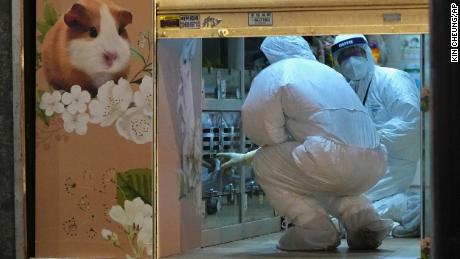Hong Kong plans to cull 2,000 hamsters over Covid fears. Pet owners are outraged

The announcement by the Hong Kong government on Tuesday was met with outrage by pet owners and animals rights advocates, with several online petitions urging authorities to reconsider.It comes after an emerging cluster linked to the Little Boss pet store, where a 23-year-old employee was confirmed positive for the Delta variant on Monday. A customer who visited the store and interacted with the employee later tested positive as well.After investigating the pet store, officials said on Tuesday that 11 hamsters had tested preliminary positive for Covid, raising concerns around the possibility of animal-to-human transmission.Generally, international Environmental samples taken at the shop’s warehouse, where other species of small animals are held, also confirmed traces of coronavirus, officials said. The hamsters at the pet store were imported from the Netherlands in two batches — on December 22 and January 7.On Tuesday, authorities seized all the small animals in the shop, including hamsters, rabbits, guinea pigs and chinchillas, to be tested and euthanized — regardless of the test result — citing a health hazard to the public. All pet stores selling hamsters in the city have been ordered to hand the animals over to be put down, with similar orders for anybody who bought a hamster in the lead-up to Christmas, beginning December 22. Photos on Tuesday night show Covid control workers in hazmat suits at numerous pet stores, disinfecting the premises and bringing out bulky red plastic bags.All animals taken from the store would be dealt with “humanely,” authorities said.According to the US Centers for Disease Control and Prevention, there have been documented Covid-19 cases in animals who likely caught the virus from humans — however, there is far less evidence to suggest the possibility of animal-to-human transmission.But authorities defended the cull, arguing it was in the interest of public health and safety. Hong Kong has stuck to a strict zero-Covid approach, aiming to stamp out all cases internally while maintaining strict border controls, even as increasingly transmissible variants — first Delta and now Omicron — make that more and more difficult. Hong Kong is one of the few places still adhering to that strategy, in the hopes of reopening its border with mainland China, which continues to lock down millions of residents in an attempt to eradicate Covid.A spokesperson for the city’s Agriculture, Fisheries and Conservation Department (AFCD) said Tuesday that all hamsters would be killed regardless of their test result because the virus’ incubation period means “negative test results do not necessarily mean that the hamsters have not been infected.”He added that the government doesn’t have the facilities or means to test more than a thousand hamsters every day, let alone isolating and quarantining all the small animals in the city — so killing them was “a safe and feasible way to control the epidemic.” Testing and isolating pets, and killing only the ones determined to be a threat, “could not control the epidemic completely and may cause loopholes,” he added.Mainland China has also taken similar measures against pets during the pandemic. In September, community workers in Harbin city killed three pet cats who tested positive for the virus while their owner was in hospital quarantine, without her consent. Both cases went viral on Chinese social media, sparking widespread dismay and anger among pet owners and sympathizers — though some posters argued human lives were more important to protect than those of animals.The Hong Kong AFCD spokesperson also pointed to European countries like the Netherlands and Denmark that had conducted similar mass cullings over Covid transmission concerns. In November 2020, Denmark said it found a mutated strain of the coronavirus among its mink population that had spread to humans. In response, the government announced the culling of 17 million mink to stop its spread. But the decision was controversial — and, it emerged last year, illegal. The government was thrown into turmoil when it emerged there had been no legal basis to order the cull of healthy mink, eventually leading to the resignation of the agriculture minister. When the prime minister was called into court in December and grilled on the mink culling as protesters marched outside, she responded: “There is no explanation (for the oversight) other than that it was busy.”Danish authorities were later forced to dig up thousands of dead mink after the gas used to kill them caused carcasses to swell and resurface from their mass graves.Denmark’s parliament commissioned an inquiry into whether ministers had known that the legal framework was absent, with the investigation set to finish in April.CNN’s Wayne Chang, Lizzy Yee and Teele Rebane contributed to this report. Additional reporting by Reuters.







